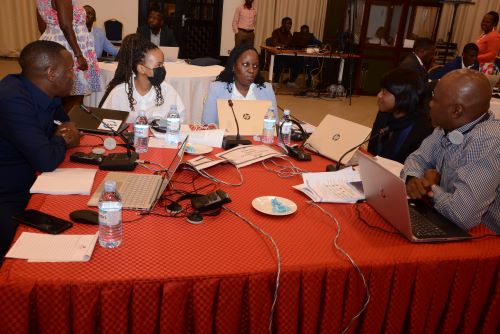At Entebbe, Uganda, by the shore of Lake Victoria, several partners came together to conduct the Pan Africa Water Governance and International Water Law training which was hosted by Global Water Partnership and the Water Resources Institute, Uganda. Among these were GWP, Northumbria University, Water Resources Institute Uganda, the African Union Development Agency (AUDA-NEPAD), CapNet, IGAD, University of Kinshasa, UNECE, IHE-Delft, GIZ, and the Nile Basin Initiative. The regional training aimed at strengthening capacities of institutions of countries and basin organisations in Africa in addressing issues related to transboundary water resources management through enhancing knowledge and skills necessary for promoting cooperation among countries.
Given the importance of transboundary water in Africa where nearly 80% of Africa’s freshwater resources are transboundary, this training was in high demand where open call for application attracted over 200 applicants from across the continent. The training built onto GWP and its partners’ past training workshops that took place between 2015-2019 and has taken place again after some break due to COVID: this time in hybrid mode. The training attracted transboundary water practitioners from across Africa, including 50 in-person participants and 78 online participants from over 13 countries from in and out of Africa. These were particularly personnel from line ministries, respective regional organizations and economic commissions that have roles in implementing transboundary investment projects.
 The training composed of four major components. Prior to the training, participants were asked to take MOOC on Governance for Transboundary Freshwater Security, to allow them to get familiar with the key concepts of international water law prior to the actual training. Lectures were mainly on key principles and theory on international water law and negotiation, while case studies were presented by participants from their experiences on common barriers and inter-sectoral challenges they face. Participants also had opportunity to practice their new skills through hands-on simulation group exercises to deepen understandings from the training. This year, additional topic of gender in water diplomacy was added reflecting the work of GWP Mediterranean and Geneva Water Hub.
The training composed of four major components. Prior to the training, participants were asked to take MOOC on Governance for Transboundary Freshwater Security, to allow them to get familiar with the key concepts of international water law prior to the actual training. Lectures were mainly on key principles and theory on international water law and negotiation, while case studies were presented by participants from their experiences on common barriers and inter-sectoral challenges they face. Participants also had opportunity to practice their new skills through hands-on simulation group exercises to deepen understandings from the training. This year, additional topic of gender in water diplomacy was added reflecting the work of GWP Mediterranean and Geneva Water Hub.
Ibrah Wahabou, the Head of Infrastructure and Connectivity Unit, AUDA-NEPAD in his opening remarks that were read by Dr Loreen Katiyo, from GWP Southern Africa, said that the training was very important for the Stakeholders at the Pan African Level because it was an avenue for sharing experiences, comparing notes, and learning together at the continental level, to address the capacity gaps. “Indeed, we are cognizant that to advance Africa’s agenda for regional integration and regional economic corridors, capacities are the requirements. Capacities to frame, implement, and manage enabling policies and programme for water investment are critical’, he remarked.
The Regional Coordinator for GWPEA, George Sanga said that the training was timely as it provided tools to aid efficient management of transboundary water resources, enhance understanding of the shared benefits resulting from sustainable water management and establishing collaborative governance mechanisms among the countries. “This will help in raising awareness and promoting the value of international legal frameworks in fostering national, regional and international cooperation”, said George. The training created the enabling environment and clarified mutual responsibilities and accountabilities amongst riparian countries that seek to mobilise investments into regional water infrastructure projects. It also contributed towards enhancing the capacities of PIDA Water sector stakeholders’ institutions, rivers basin authorities and national authorities.
A number of participants expressed that the training was very useful and would have practical application in their management of transboundary water resources. See some of the direct feedback from participants here.
Participants will have an opportunity to follow up through the conversation and exchanges from this training through Pan African Transboundary Lab, a newly established community of practice among Pan African transboundary water practitioners and hosted on GWP’s IWRM toolbox.
